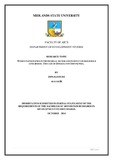Please use this identifier to cite or link to this item:
https://cris.library.msu.ac.zw//handle/11408/1985| Title: | Women participation in the informal sector and its effect on household livelihoods: the case of Zengeza 4 in Chitungwiza | Authors: | Dube, Donald | Keywords: | Women participation Informal sector, household livelihoods |
Issue Date: | 2014 | Publisher: | Midlands State University | Abstract: | The purpose of this research was to examine how the participation of women in the informal sector has impacted on household livelihoods in terms of food security, income, level and quality of education, asserts, health care and standards of living, in Zengeza 4. Particular attention was given to examine also the extent of women participation in the informal sector. Only a sample of 26 women informal operators were selected as respondents. Semi-structured questionnaires, and interviews were used to collect the information from the selected respondents. The results were based on the information captured in the questionnaires and qualitative face to face interactions. The participation of women in the informal sector has contributed to the alleviation of urban poverty. Women dominated the streets in Zengeza 4 though men also had a bigger number. Women tended to participate in culturally defined activities such as selling of both new and second hand clothes, sweets, airtime, fruit and vegetables while men ventured in activities that are more technical such as sofa making, bed making and other kitchen property. The income in many households increased as compared to the period when they were not selling on the streets. Food security was enhanced to a standard of three meals/per day though the quality differed, women afforded to buy movable and immovable assets such as houses, cars, house property, and women afforded to pay accommodation rentals, clothing their children and taking their children to hospital in the event of sickness and other medical complications. Women participation in the informal sector has thus proven to be a viable development strategy for alleviation of poverty in many households though they faced challenges such as harassment by town council police, corrupt council officials, high interest rates from microfinance institutions, lacked of permanent trading sites and low demand and competition. | URI: | http://hdl.handle.net/11408/1985 |
| Appears in Collections: | Bachelor Of Arts In Development Studies Honours Degree |
Files in This Item:
| File | Description | Size | Format | |
|---|---|---|---|---|
| R111182R.pdf | Full Text | 1.28 MB | Adobe PDF |  View/Open |
Page view(s)
22
checked on Jul 27, 2024
Download(s)
24
checked on Jul 27, 2024
Google ScholarTM
Check
Items in MSUIR are protected by copyright, with all rights reserved, unless otherwise indicated.



